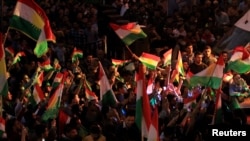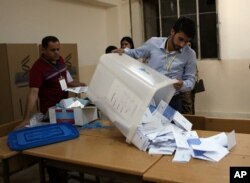Iraqi Kurdish leader Masoud Barzani claimed victory in the referendum vote for independence and called for a "dialogue" with the Iraqi government.
In a televised address, Barzani said "negotiations are the right path to solve the problems, not threats or the language of force.” He added, "we assure the international community of our willingness to engage in dialogue with Baghdad."
On Monday, Iraqi Kurds voted on an independence referendum despite objections from the government in Baghdad, neighboring countries, and the United States.
At the voting centers in the Kurdistan Regional capital, many voters wore traditional clothes and carried Kurdish flags. Some said they believed this vote could be the start of their dream for independence coming true.
One man named Mohammad carried his young son and a flag at a voting center in the northern city of Irbil. He told VOA, “It is a true day for us … We have been waiting for 100 years for this. It is beautiful.”
Several areas reported peaceful scenes of large numbers of people voting. But before the last voter entered their decision, Iraqi leaders had already sent troops to areas disputed by Iraq and the Kurds seeking independence. Iraqi Prime Minister Haider al-Abadi promised to take all “necessary measures” to keep all of Iraq united as one.
Iraqi Kurdistan Regional President Masoud Barzani has continued to challenge the country’s leadership in Baghdad. On Sunday, he said the independence vote was the will of the Kurdish people and “out of his hands.”
"Independence will allow us not to repeat past tragedies,” he added. “The partnership with Baghdad has failed and we will not return to it."
A representative for United Nations Secretary-General Antonio Guterres called the decision to hold the vote in disputed areas especially destabilizing.
"The Secretary-General regrets that the opportunity for serious negotiations … between the Government of Iraq and the Kurdistan Regional Government, based on the constitution and in a spirit of partnership … were not fully seized prior to this move," the representative said in a statement.
Heather Nauert is a spokesperson for the U.S. Department of State. She said the United States is "deeply disappointed" with the decision to hold a vote for only one group of people. Nauert added that the U.S. relationship with the Iraqi Kurds would not change. But the vote will "greatly complicate" Kurdish relationships with the Iraqi government and neighboring countries, she noted.
Masoud Barzani told VOA's Persian Service last week that after the vote, the Kurdish government would begin talks with Iraqi officials. The discussion would include issues like borders, division of natural resources and a timeline for independence. Barzani said the process of separating Kurdistan from Iraq would take about one to two years.
Before the vote, Iraqi Prime Minister Abadi ordered the Kurdish region to give control of its border crossings and airports to his government. He also called on other countries not to import Kurdish oil.
Neighboring Iran, Syria and Turkey all have large Kurdish populations. The Iranian and Turkish governments have expressed disapproval for the independence vote. They fear it could give support to similar separatist movements in their countries.
Turkey has battled Kurdish rebels seeking independence in its southeast region for 30 years. President Recep Tayyip Erdogan said Turkey would close a border crossing with Iraq and could move to block oil exports.
Syrian Foreign Minister Walid Moallem rejected the vote and said that Syria only accepts a unified Iraq.
I’m Pete Musto.
Heather Murdock reported this for VOA News with help from the Persian Service. Pete Musto adapted it for Learning English. Hai Do was the editor.
We want to hear from you. Do you think Iraq should let the Kurdish region become an independent nation? What affect do you think that will have on the rest of the Middle East? Write to us in the Comments Section or on our Facebook page.
_____________________________________________________________
Words in This Story
referendum - n. an event in which the people of a county, state or area vote for or against a law that deals with a specific issue
dialogue - n. a discussion or series of discussions that two groups or countries have in order to end a disagreement
negotiation(s) – n. a formal discussion between people who are trying to reach an agreement
allow – v. to permit something
tragedies – n. very bad events that cause great sadness and often involves someone's death
destabilizing – adj. causing something, such as a government, to be unable to continue existing or working in the usual or desired way
opportunity – n. an amount of time or a situation in which something can be done
prior – adj. before
disappointed – adj. feeling sad, unhappy, or displeased because something was not as good as expected or because something you hoped for or expected did not happen
complicate – v. to make something more difficult or less simple
separatist – n. a member of a group of people who want to form a new country or religion that is separate from the one they are in now







